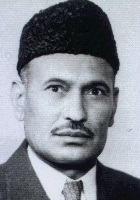The River Poem by Gul Pacha Ulfat
The River
A large river flows alongside the vast deserts and dry steppes; but it provides no water to that arid wasteland. In this harsh drought, when people crack each others' skulls over water, it rushes past like a ruthless stingy miser, caring nothing for our thirst.
When its water rises and its waves churn, it carries away houses and cultivated fields along with itself. The same river flows differently once beyond our lands, treating other people differently. It does not inflict this sort of destruction over there. It isn't stingy over there, nor does it contain this sort of mercilessness. Over there, people pan for gold in the sand of its banks.
Over there fishermen catch bushels of fish from its water, and hunters hunt ducks in the huge marshy ponds that it forms. Numerous canals have been tapped from its waters. Huge fields are now watered. Villages and towns flourish.
There, barren lands have blossomed to fertility, and there is no shortage of grains and fruits. There, big dams have been set up in the course of the river; hydroelectric turbines have been installed; factories have started humming with work; and people are prosperous and full-bellied.
How can the river have such different faces here and there?
It rages at us, but is compassionate on them. Here it hurtles by in rapids; there it flows gently and slowly.
Here it zigs and zags; and there it follows the path assigned to it and does not divert from it. In reality, here it inflicts great destruction while there it submits to law and order, and is not allowed to destroy anything.
Our blame is laid on the river: "It has taken away so much from us; has killed so many among us. This is bloodthirsty river, with an ancient vendetta against us. It has destroyed our homes more than once, and swept away our cultivated fields again and again."
All our blame is laid on the river: "It is powerful and can inflict oppression and cruelty on us at any time."
Ah, what a shame. How unwise we are, to think this way as we do. We do not understand our own faults, and so we heap our blame down on the river bank. But we ourselves have settled down there on its banks. Really, the fault is ours, not the river's!
The river does not consider anyone in particular to be an enemy. The river will give water to anyone who is thirsty, and will clean anyone's dirty laundry. What the river needs is solid, mature work, and concrete dams reigning it in. If our actions were firm and our dams were concrete, our irrigation streams would not dry up and our fields would not be swept away.
We did not know how to reign in the river, and so we could not use it to our advantage. This river is the river of life. It contains within itself the powers both of destruction and prosperity alike. The river looks at the talent and ability of all sides, and then apportions them their due share. It does not give an equal share to two people if one comes down with a clay pot and the other comes with a small jar; and small rivulets cannot give benefits on the same scale as large canals.
The river tests the work of every one and then deals with them on that basis. It destroys dams made of earth, and submits to concrete ones. Those who leave the river of life uncontrolled, and cannot define a due course for it, cannot reap the benefits available in their own lives.
This poem has not been translated into any other language yet.
I would like to translate this poem